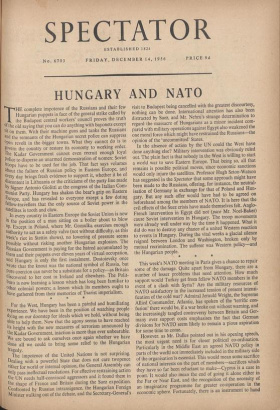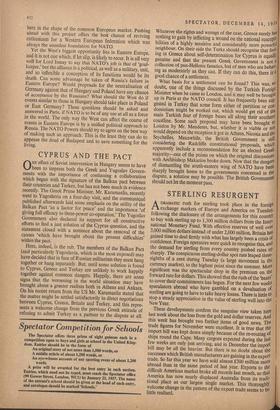HUNGARY AND NATO
IFHE complete impotence of the Russians and their few Hungarian puppets in face of the general strike called by the Budapest central workers' council proves the truth of the old saying that you can do anything with bayonets except Sit on them. With their machine guns and tanks the Russians and the remnants of the Hungarian secret police can suppress °Pen revolt in the bigger towns. What they cannot do is to govern the country or restore its economy to working order. The Kadar Government cannot even recruit enough loyal Police to disperse an unarmed demonstration of women; Soviet troops have to be used for the job. That fact says volumes about the failure of Russian policy in Eastern Europe, and every day brings fresh evidence to support it, whether it be of discontent in Lithuania or the criticisms of the party line made by Signor Antonio Giolitti at the congress of the Italian Com- munist Party. Hungary has shaken the bear's grip on Eastern Europe, and has revealed to everyone except a few doting fellow-travellers that the only source of Soviet power in the satellites is tooth and claw.
In every country in Eastern Europe the Soviet Union is now In the position of a man sitting on a boiler about to blow 413. Except in Poland, where Mr. Gomulka exercises enough authority to act as a safety valve (not without difficulty, as this Week's riot in Stettin shows), no lowering of pressure seems Possible without risking another Hungarian explosion. The Russian Government is paying for the hatred accumulated by them and their puppets over eleven years of virtual occupation, and Hungary is only the first instalment. Dostoievsky once Wrote that the knout was the national symbol of Russia, but Pure coercion can never be a substitute for a policy—as Britain discovered to her cost in Ireland and elsewhere. The Polit- buro is now learning a lesson which has long been familiar to other colonial powers; a lesson which its members ought to have gathered from their memories of Tsarist imperialism.
For the West, Hungary has been a painful and humiliating experience. We have been in the position of watching people dying on our doorstep for ideals which we hold, without being able to help them. Now that the agony seems to have reached its height with the new measures of terrorism announced by the Kadar Government, inaction is more than ever unbearable. We are bound to ask ourselves once again whether we have done all we could to bring some relief to the Hungarian tragedy.
The impotence of the United Nations is not surprising. healing with a powerful State that does not care twopence either for world or internal opinion, the General Assembly can Only pass ineffectual resolutions. For effective restraining action the UN needs half-convinced aggressors and it found them in the shape of France and Britain during the Suez expedition. Confronted by Russian intransigence, the Hungarian Foreign Minister walking out of the debate, and the Secretary-General's visit to Budapest being cancelled with the greatest discourtesy, nothing can be done. International attention has also been distracted by Suez, and Mr. Nehru's strange determination to regard the massacre of Hungarians as a minor incident com- pared with military operations against Egypt also weakened the one moral force which might have restrained the Russians—the opinion of the 'uncommitted' States.
In the absence of action by the UN could the West have done anything else? Military intervention was obviously ruled out. The plain fact is that nobody in the West is willing to start a world war to save Eastern Europe. That being so, all that remains is possible political moves, since economic sanctions would only injure the satellites. Professor Hugh Seton-Watson has suggested in the Spectator that some approach might have been made to the Russians, offering, for instance, the neutral- isation of Germany in exchange for that of Poland and Hun- gary. But any such offer would have had to be agreed on beforehand among the members of NATO. It is here that the evil effects of the Suez crisis have made themselves felt. Anglo- French intervention in Egypt did not (pace Mr. Noel-Baker) cause Soviet intervention in Hungary. The troop movements were already well under way by the time it happened. What it did do was to destroy any chance of a united Western reaction to events in Hungary. During the vital weeks a glacial silence reigned between London and Washington, broken only by mutual recrimination. The sufferer was Western policy—and the Hungarian people.
This week's NATO meeting in Paris gives a chance to repair some of the damage. Quite apart from Hungary, there are a number of lesser problems that need attention. How much support would Turkey get from fellow NATO members in the event of a clash with Syria? Are the military resources of NATO satisfactory in the increased tension of present intensi- fication of the cold war? Admiral Jerauld Wright, the Supreme Allied Commander, Atlantic, has spoken of the 'terrific con- fusion' there would be, if a war broke out without warning, and the increasingly tangled controversy between Britain and Ger- many over support costs emphasises the fact that German divisions for NATO seem likely to remain a pious aspiration for some time to come.
However, as Mr. Dulles pointed out in his opening speech, the most urgent need is for closer political co-ordination. Particularly in the Middle East an agreed NATO policy in parts of the world not immediately included in the military side of the organisation is essential. This would mean some sacrifice of national interests on the part of members—sacrifices which they have so far been reluctant to make—Cyprus is a case in point. It would also mean the end of going it alone either in the Far or Near East, and the recognition of the necessity of an imaginative programme for greater co-operation in the economic sphere. Fortunately, there is an instrument to hand here in the shape of the common European market. Pushing ahead with this project offers the best chance of reviving enthusiasm for a Western European federation which was, always the soundest foundation for NATO.
Yet the West's biggest opportunity lies in Eastern Europe, and it is not one which, if let slip, is likely to recur. It is all very well for Lord Imlay to say that NATO's job is that of 'goal- keeper,' but the alliance is a political, as well as a military, unit, and so inflexible a conception of its functions would be its death. Can some advantage be taken of Russia's failure in Eastern Europe? Would proposals for the neutralisation of Germany against that of Hungary and Poland have any chance of acceptance by the Russians? What should the West do if events similar to those in Hungary should take place in Poland or East Germany? These questions should be asked and answered in Paris, if NATO is to be of any use at all as a force in the world. The only way the West can affect the course of events in Eastern Europe is by a unified political approach to Russia. The NATO Powers should try to agree on the best way of making such an approach. This is the least they can do to appease the dead of Budapest and to save something for the living.











































 Previous page
Previous page